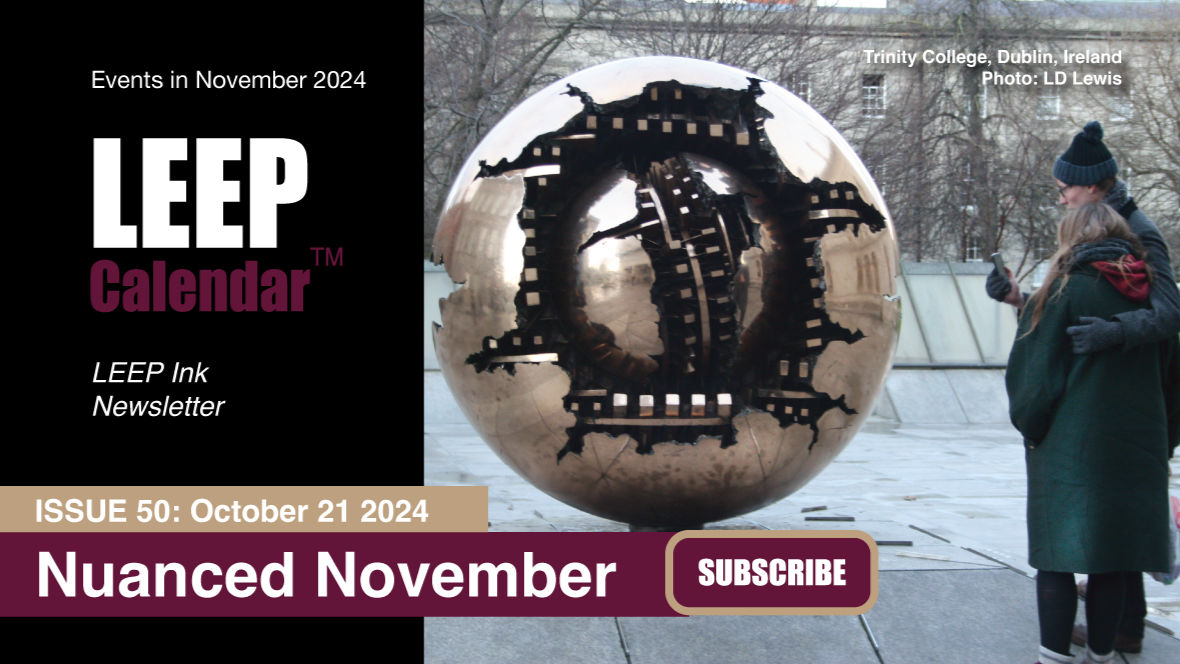 AD
AD
Today is: December 18
Scroll to explore events active on this date.
Additional Events on LEEP
LEEP INK FEATURES

2025 is the Year of...
21 Themes and 'Year of' Events for 2025 PART ONE, THE FIRST 12 Every year, various organizations announce the theme for the year. These themes can focus on causes, such as aesthetics and color tre...

Nuanced November 2024
November is the start of the holiday season in many parts of the world. It is a time for family, football, food, shopping and decorating, particularly in the Christian and Jewish world, leading to Christmas and...

December's Gift
Events in December 2024. Well, we made it to December. December is the holiday season, particularly in Western nations, where Christianity and Judaism are the faiths most common in the nation's past. ...
Sobre la Semana de La Lactancia Latina
Health , Career
Food , United States
Ends: Sep 11, 2025
DESCRIPTION:
SEMANA DE LA LACTANCIA LATINA: APOYANDO A LAS MADRES LATINAS
(English translation below.)
La Semana de La Lactancia Latina se lleva a cabo en conjunto con el Mes Mundial de la Lactancia Materna y la Semana de Lactancia en el Lugar de Trabajo, que tienen como objetivo promover y apoyar la lactancia materna dentro de la comunidad latina en los Estados Unidos. El Comité de Lactancia Materna de los Estados Unidos (USBC, por sus siglas en inglés), en colaboración con varias organizaciones de salud y culturales, lidera el evento. La campaña de concienciación de cinco días busca aumentar la conciencia sobre los beneficios de la lactancia materna y abordar los desafíos únicos que enfrentan las madres latinas.
POR QUÉ LA LACTANCIA ES IMPORTANTE
La lactancia materna no solo es importante; es esencial para la salud y el bienestar de los bebés y las madres. Organizaciones de salud, incluyendo la Academia Americana de Pediatría y la Organización Mundial de la Salud, recomiendan la lactancia materna exclusiva durante los primeros seis meses de vida del niño. La lactancia proporciona nutrientes vitales y anticuerpos que protegen a los bebés de infecciones y enfermedades crónicas. Para las madres, ayuda en la recuperación posparto y reduce el riesgo de ciertos tipos de cáncer y otros problemas de salud. Este impacto positivo en la salud es una razón de esperanza y optimismo.
La Semana de La Lactancia Latina tiene como objetivo empoderar a las madres latinas proporcionando educación, recursos y apoyo para fomentar la lactancia materna. La iniciativa destaca la importancia cultural de la lactancia y busca crear un entorno comunitario de apoyo que respete y promueva esta práctica. También aboga por cambios en las políticas para asegurar que las madres latinas tengan el apoyo necesario para amamantar con éxito. Tu papel en la creación y mantenimiento de este entorno comunitario de apoyo es crucial.
LAS MUJERES LATINAS ENFRENTAN DESAFÍOS ADICIONALES
Las mujeres latinas a menudo enfrentan desafíos específicos cuando intentan amamantar. Las barreras culturales, las diferencias lingüísticas y la falta de apoyo específico pueden dificultar su viaje de lactancia. Además, las madres latinas pueden enfrentar presiones económicas y sociales que hacen difícil priorizar la lactancia. El acceso a recursos y servicios de apoyo a la lactancia también puede ser limitado en algunas comunidades.
Muchas empresas están trabajando para acomodar a las madres lactantes implementando medidas de apoyo como la provisión de salas de lactancia dedicadas, horarios de descanso flexibles y acceso a consultores de lactancia. Estos esfuerzos son cruciales para ayudar a las madres a equilibrar sus responsabilidades laborales con su deseo de amamantar.
A pesar de estos avances, las madres latinas todavía enfrentan obstáculos en el lugar de trabajo. Los problemas comunes incluyen la falta de espacios privados e higiénicos para extraer leche, tiempos de descanso insuficientes y la falta de comprensión o apoyo por parte de colegas y supervisores. Estos desafíos pueden dificultar que las madres latinas continúen amamantando después de regresar al trabajo.
La Semana de La Lactancia Latina busca abordar estas barreras abogando por políticas laborales más robustas y proporcionando a los empleadores las mejores prácticas para apoyar a las madres lactantes. El evento enfatiza la importancia de crear un entorno amigable con la lactancia y ofrece recursos para ayudar a las madres latinas a navegar los desafíos que puedan encontrar.
CONCLUSIÓN
Al promover estas iniciativas, la Semana de La Lactancia Latina subraya la importancia de la lactancia materna y el esfuerzo colectivo necesario para apoyar a las madres latinas. Nos recuerda que, con el apoyo y los recursos adecuados, la lactancia materna puede ser una experiencia positiva y empoderadora para las familias latinas, y es nuestra responsabilidad colectiva asegurar que este apoyo esté en su lugar.
_______________
ENGLISH VERSION
SEMANA DE LA LACANCIA LATINA: SUPPORTING LATINA MOTHERS
Semana de La Lactancia Latina occurs in conjunction with World Breastfeeding Month and Workplace Lactation Week, which are aimed at promoting and supporting breastfeeding within the Latina community in the United States. The United States Breastfeeding Committee (USBC), in collaboration with various health and cultural organizations, champions the event. The five-day awareness campaign seeks to raise awareness about the benefits of breastfeeding and to address the unique challenges faced by Latina mothers.
WHY NURSING IS IMPORTANT
Breastfeeding is not just important; it's essential for infants' and mothers' health and well-being. Health organizations, including the American Academy of Pediatrics and the World Health Organization, recommend exclusive breastfeeding for the first six months of a child's life. Breastfeeding provides vital nutrients and antibodies that protect infants from infections and chronic diseases. For mothers, it aids in postpartum recovery and reduces the risk of certain cancers and other health issues. This positive impact on health is a reason for hope and optimism.
Semana de La Lactancia Latina aims to empower Latina mothers by providing education, resources, and support to encourage breastfeeding. The initiative highlights the cultural significance of breastfeeding and seeks to create a supportive community environment that respects and promotes this practice. It also advocates for policy changes to ensure that Latina mothers have the necessary support to breastfeed successfully. Your role in creating and maintaining this supportive community environment is crucial.
LATINA WOMEN FACE EXTRA CHALLENGES
Latina women often encounter specific challenges when trying to breastfeed. Cultural barriers, language differences, and a lack of targeted support can hinder their breastfeeding journey. Additionally, Latina mothers may face economic and social pressures that make it challenging to prioritize breastfeeding. Access to breastfeeding resources and support services can also be limited in some communities.
Many companies are working to accommodate nursing mothers by implementing supportive measures such as providing dedicated lactation rooms, flexible break times, and access to lactation consultants. These efforts are crucial in helping mothers balance their work responsibilities with their desire to breastfeed.
Despite these advancements, Latina mothers still face obstacles in the workplace. Common issues include a lack of private, hygienic spaces to pump milk, insufficient break times, and a lack of understanding or support from colleagues and supervisors. These challenges can make it difficult for Latina mothers to continue breastfeeding after returning to work.
Semana de La Lactancia Latina seeks to address these barriers by advocating for more robust workplace policies and providing employers with best practices to support nursing mothers. The event emphasizes the importance of creating a breastfeeding-friendly environment and offers resources to help Latina mothers navigate the challenges they may encounter.
CONCLUSION
By promoting these initiatives, Semana de La Lactancia Latina underscores the importance of breastfeeding and the collective effort needed to support Latina mothers. It reminds us that breastfeeding can be a positive and empowering experience for Latina families with the proper support and resources, and it's our collective responsibility to ensure this support is in place.
VIDEOS
SUPPORTING DOCUMENTS
Currently, this event does not have supporting documents.
ADDITIONAL IMAGES
Currently, this event does not have supporting images.
Where would you like to go now?
 AD
AD


/footer-logo.svg)
